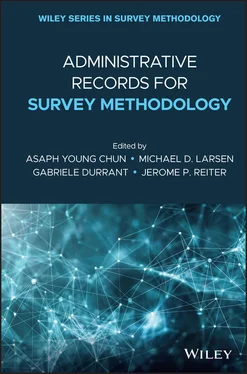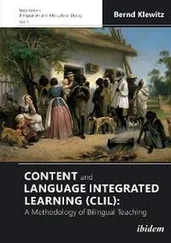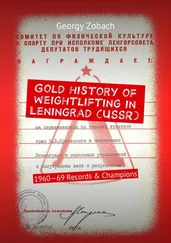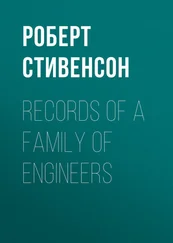Section 4 looks beyond statistical methodology for use of administrative records with surveys and provides three articles about using administrative data in evidence-based policymaking. The applications are in health, economics, and education. Chapter 11, by Cordell Golden and Lisa Mirel, focuses on enhancement of health surveys at the U.S. National Center for Health Statistics, through data linkage. Chapter 12, by Bruce Meyer and Nikolas Mittag, concerns economic policy analysis, with an emphasis on using administrative records to improve income measurements. Chapter 13, by Peter Siegel, Darryl Creel, and James Chromy, discusses combining data from multiple sources in the context of education studies.
The book is intended for a diverse audience. It should provide insight into developments in many areas and in many countries for those conducting surveys and their partners who manage and seek to improve administrative records. Several articles present theory as well as application and advice based on practical experience. Many chapters in the book include exercises for reflection on the material presented. The book could be of interest to students of statistics, survey sampling and methodology, and quantitative applications in government. Certainly, the book will have useful chapters for a variety of courses.
Data science has emerged as a term for an integration of statistics, mathematics, and computing and their integration in the effort to solve complex problems. Administrative records along with large-scale sample surveys provide a setting for the best applications in data science. This book hopefully will motivate those in the data science community to learn about survey sampling, official statistics, and a rich body of work aiming to utilize administrative records for sample surveys and survey methodology.
23 May 2020
Asaph Young Chun
Statistics Research Institute
Statistics Korea, Republic of Korea
Michael D. Larsen
Department of Mathematics and Statistics
Saint Michael’s College, United States
Gabriele Durrant
Department of Social Statistics and Demography
Southampton University, UK
Jerome P. Reiter
Department of Statistical Science
Duke University, United States
1 1977 Cochran, W.G. (1977). Sampling Techniques, 3e. Wiley.
2 1975 Efron, B. and Morris, E. (1975). Data analysis using Stein’s estimator and its generalizations. Journal of the American Statistical Association 70 (350): 311–319.
3 1953 Hansen, M.H., Hurwitz, W.N., and Madow, W.G. (1953). Sample Survey Methods and Theory, Volume 1: Methods and Applications; Volume 2: Theory. Wiley.
4 1967 Kish, L. (1967). Survey Sampling, 2e. Wiley.
5 1986 Rubin, D.B. (1986). Statistical matching using file concatenation with adjusted weights and multiple imputations. Journal of Business and Economic Statistics 4: 87–94.
6 1987 Rubin, D.B. (1987). Multiple Imputation for Nonresponse in Surveys. New York: Wiley.
7 1992 Särndal, C.-E., Swensson, B., and Wretman, J. (1992). Model Assisted Survey Sampling. Springer Series in Statistics: Springer.
The origin of this book can be traced to the 2017 meeting of the European Survey Research Association and the session “Administrative Records for Survey Methodology” ( https://www.europeansurveyresearch.org/conference/programme2017?sess=81). Dr. Asaph Young Chun (then of the U.S. Bureau of the Census). was the lead organizer and chair. Additional coordinators of that session included Drs. Michael Larsen (then at George Washington University, Washington, DC), Ingegerd Jansson (Statistics Sweden), Manfred Antoni (Institute for Employment Research, IAB, Germany), and Daniel Fuss and Corinna Kleinert (Leibniz Institute for Educational Trajectories, Germany). Papers presented at the conference included “Evaluation of the Quality of Administrative Data Used in the Dutch Virtual Census” (Schulte et al. 2017), “Evaluating the Accuracy of Administrative Data to Augment Survey Responses” (Berzofsky, Zimmer, and Smith 2017), and “Assessing Administrative Data Quality: The Truth is Out There” (Chun and Porter 2017).
Dr. Chun with Dr. Larsen proposed the book entitled Administrative Records for Survey Methodology to Wiley publishing. The intent of the book was to follow on the conference and reach further into topics and applications in additional countries and disciplines. Dr. Jerry Reiter (Duke University) and Dr. Gabriele Durrant (University of Southamptom) joined the team as assistant editors. Since the inception of this book, Dr. Chun has joined Statistics Korea and Dr. Larsen has moved to Saint Michael’s College in Vermont.
The topics described by authors in this book have been described by these authors and others at international conferences since the 2017 ESRA meeting. Dr. Chun organized panel sessions at the Joint Statistical Meetings in 2019 entitled “Linked Data to Advance Evidence Building in Public Policy” ( https://ww2.amstat.org/meetings/jsm/2019/onlineprogram/ActivityDetails.cfm?SessionID=218399) and in 2018 entitled “Administrative Records for Survey Methodology and Evidence Building” ( https://ww2.amstat.org/meetings/jsm/2018/onlineprogram/ActivityDetails.cfm?SessionID=215012). Some contributors to the current book participated in these panels.
We wish to thank individuals who have contributed toward bringing this volume to fruition. Many people have worked together to make this book possible. First, editors made comments and suggestions to improve the several chapters in this book. Second, a few individuals served as anonymous reviewers on individual chapters. Third, eight anonymous reviews on the overall scheme of the book were provided by the publisher Wiley. Fourth, the individual authors have been attentive to comments and suggestions from the editors and reviewers and generous with their time in improving their contributions. Fifth, authors and reviewers have contributed to these efforts with the support of their government agencies, educational institutions, sponsored funding organizations, and companies. Together all involved have made the present work a reality. We apologize if we have failed to mention any contributors.
Finally, we wish to thank individuals at Wiley who agreed to publish this manuscript and who have helped us along the way. Their reminders of deadlines and encouragements have kept us going through some transitions. Specifically, we wish to thank Associate Editor Kathleen Santoloci, Project Editors Blesy Regulas and Linda Christina, support person Mindy Okura-Marszycki, Managing Editor Kimberly Monroe-Hill, and Content Refinement Specialist Viniprammia Premkumar of Wiley Knowledge & Learning.
We hope you find the chapters in this book interesting and useful. We look forward to new developments with the use of administrative records and other data sources with sample surveys.
1 2017 Berzofsky, M., Zimmer, S., and Smith, T. (2017). Evaluating the accuracy of administrative data to augment survey responses. Presentation at the 7th Conference of the European Survey Research Association (ESRA).
2 2017 Chun, A.Y., and Porter, S. (2017). Assessing administrative data quality: the truth is out there. Presentation at the 7th Conference of the European Survey Research Association (ESRA).
3 2017 Schulte, E., Daas, P., Tennekes, M., and Ossen, S. (2017). Evaluation of the quality of administrative data used in the Dutch virtual census. Presentation at the 7th Conference of the European Survey Research Association (ESRA).
Part I Fundamentals of Administrative Records Research and Applications
1 On the Use of Proxy Variables in Combining Register and Survey Data
Читать дальше












